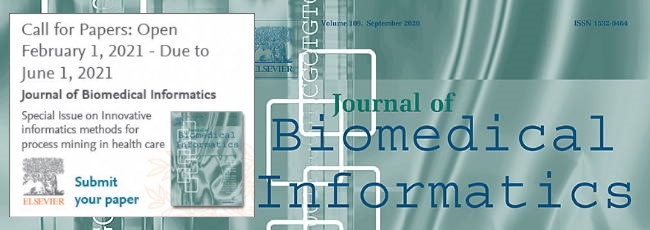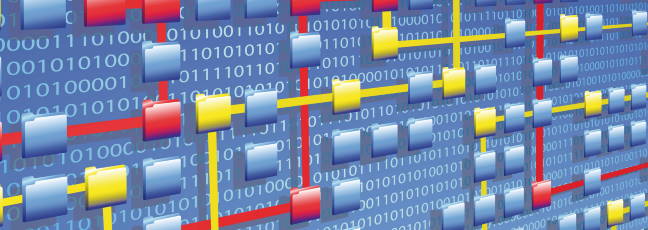Call for Papers - Innovative informatics methods for process mining in health care

Call for Papers
Innovative informatics methods for process mining in health care
The world’s most valuable resource is no longer oil, but data. The biomedical and health domains are no exception. The ultimate goal of biomedical informatics techniques is not to collect more data, but to extract valuable knowledge and insights from existing data. Regarding the execution of clinical processes, more and more data are being captured in the form of event data by, for instance, electronic health record systems. Event data constitutes a key source of information to analyze and improve clinical processes. In recent years, a new discipline has emerged which combines traditional process analysis and data-centric analysis: process mining. Research interest, focusing on the development of innovative methods, has experienced a remarkable growth in recent years. In 2016, the review paper “Process mining in health care: a literature review” [1], published in JBI, identified 74 articles on this topic. By mid 2020, the number of articles citing this same review reached more than 285. Within the biomedical informatics context, process mining contributions have dealt with various challenges in recent years. These include, for instance, the extraction of typical treatment processes from electronic medical records [2], the automatic detection of process deviations in trauma resuscitation [3], the discovery of collaboration patterns between health care professionals in the emergency room [4], and the suitable abstraction of medical event data to discover processes and compare traces [5].
This special issue provides a high-quality forum for interdisciplinary researchers to propose novel informatics methods for process mining in health care. The submitted papers should center around relevant problems experienced in the medical domain and propose innovative process mining methods to deal with them. Hence, submissions should move beyond using a brief health care application simply to illustrate a highly generic process mining method. The special issue welcomes high-quality and innovative submissions on a wide range of topics, including (but not limited to):
- Data extraction, integration and preparation for process mining in health care
- Data-driven modeling, analysis and improvement of health care processes
- Data-driven compliance analysis for health care processes
- Data-driven monitoring of health care processes
- Multi-perspective approaches for process mining in health careRoot-cause analysis for health care processes
- Predictive analytics for health care processes
- Data-driven process recommendations in health care
- Data-driven simulation and optimization of health care processes
- Human-in-the-loop approaches to process mining in health care
- Privacy-preserving approaches for process mining in health care
For all topics, the focus should be on the development of novel methods and techniques for process mining in a biomedical informatics context.
1. Peer review process
All submitted papers must be original and will go through a rigorous peer-review process with at least two reviewers. Papers previously published in conference proceedings will not be considered. JBI’s editorial policy will be strictly followed by special issue reviewers. Note in particular that JBI emphasizes the publication of papers that introduce innovative and generalizable methods of interest to the informatics community. Specific applications can be described to motivate the methodology being introduced, but papers that focus solely on a specific application are not suitable for JBI.
2. Submissions
Authors must submit their papers via the online Editorial Manager at https://www.editorialmanager.com/jbi by June 1, 2021. Authors should select “Informatics for Process Mining” as their submission category and note in a cover letter that their submission is for the “Special Issue on Innovative Informatics Methods for Process Mining in Health Care”. If the manuscript is not intended as an original research paper, the cover letter should also specify if it is, rather, a Methodological Review, Commentary, or Special Communication. Authors should make sure to place their work in the context of human-focused biomedical research or health care, and to review carefully the relevant literature.
JBI’s editorial policy, and the types of articles that the journal publishes, are outlined under Aims and Scope on the journal home page at https://www.journals.elsevier.com/journal-of-biomedical-informatics (click on “Read more” for full details). All submissions should follow the guidelines for authors at https://www.elsevier.com/journals/journal-ofbiomedical-informatics/1532-0464/guide-for-authors, including format and manuscript structure. If the authors speak a first language other than English, editorial assistance by a native English speaker is highly recommended prior to submission. Open-source software code and data should ideally be made available through Internet resources that are enduring. JBI is an international journal and generalizable contributions from throughout the world are highly encouraged.
Authors will have the opportunity to select whether their accepted paper will be published in JBI or in JBI-X – the new open-access mirror journal of JBI (https://www.sciencedirect.com/journal/journal-of-biomedical-informatics-x). For papers submitted to the special issue before the deadline on June 1, 2021, the JBI-X publication fee of $2300 will be waived if the authors of accepted articles select to publish open access. JBI and JBI-X recognize that authors want their accepted papers published as soon as possible. Therefore, it is JBI and JBI-X policy to publish accepted special issue papers in the next regular issue of the journal upon acceptance. The full special issue is then compiled when the last paper has been accepted (see the collection of virtual special issues at https://www.sciencedirect.com/journal/journal-of-biomedical-informatics/specialissues). Special issues contain a mix of papers from JBI and JBI-X, depending on the publication preference of the authors.
3. Questions regarding the special issue
Please direct any questions regarding the special issue to Dr. Jorge Munoz-Gama (jmun@uc.cl).
Guest editors:
- Jorge Munoz-Gama
Human & Process Research Lab (HAPLAB),
Department of Computer Science, School of Engineering,
Pontificia Universidad Católica de Chile, Santiago, Chile - Niels Martin
Research Group Business Informatics, Hasselt University, Hasselt, Belgium
Data Analytics Laboratory, Vrije Universiteit Brussel, Brussels, Belgium - Carlos Fernandez-Llatas
ITACA Institute – Process Mining 4 Health Lab,
Universitat Politècnica de Valencia, Valencia, Spain
Department of Clinical Sciences,
Intervention and Technology (CLINTEC), Karolinska Institutet, Stockholm, Sweden - Owen Johnson
School of Computing,
Leeds University, Leeds, United Kingdom - Marcos Sepúlveda
Human & Process Research Lab (HAPLAB),
Department of Computer Science, School of Engineering,
Pontificia Universidad Católica de Chile, Santiago, Chile
References
- [1] E. Rojas, J. Munoz-Gama, M. Sepúlveda, D. Capurro Process mining in health care: A literature review J. Biomed. Inform., 61 (2016), pp. 224-236
- [2]J. Chen, L. Sun, C. Guo, W. Wei, Y. XieA data-driven framework of typical treatment process extraction and evaluation J. Biomed. Inform., 83 (2018), pp. 178-195
- [3]S. Yang, A. Sarcevic, R.A. Farneth, S. Chen, O.Z. Ahmed, I. Marsic, R.S. BurdAn approach to automatic process deviation detection in a time-critical clinical process J. Biomed. Inform., 85 (2018), pp. 155-167
- [4]C. Alvarez, E. Rojas, M. Arias, J. Munoz-Gama, M. Sepúlveda, V. Herskovic, D. CapurroDiscovering role interaction models in the emergency room using process mining J. Biomed. Inform., 78 (2018), pp. 60-77
- [5]G. Leonardi, M. Striani, S. Quaglini, A. Cavallini, S. MontaniLeveraging semantic labels for multi-level abstraction in medical process mining and trace comparison J. Biomed. Inform., 83 (2018), pp. 10-24
- News created on February 8 2021, 10:21.
- This news has been updated on February 8 2021, 10:24
- Author: Jorge Munoz-Gama

